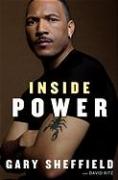


Baseball Toaster was unplugged on February 4, 2009.
Email me at btimmermann@gmail.com
Select a date:
 Looking at the size of Gary Sheffield’s new autobiography Inside Power (written by David Ritz), you wouldn’t expect much. It’s a slim book (242 pages including an index) and there’s a lot of white space on the pages. And the book delivers about as much as you would expect. In other words, there’s not a lot to this book.
Looking at the size of Gary Sheffield’s new autobiography Inside Power (written by David Ritz), you wouldn’t expect much. It’s a slim book (242 pages including an index) and there’s a lot of white space on the pages. And the book delivers about as much as you would expect. In other words, there’s not a lot to this book.
"Inside Power" is what Sheffield says his uncle, Dan Gooden, father of Dwight, said that young Gary possessed. It was something special that made him better than the other kids.
And it was clear growing up that Sheffield was a supremely gifted player. His Tampa Little League team made it to the championship game at Williamsport, but lost 4-3 to a team from Taiwan.
The next year, Sheffield got kicked off the same team for missing a practice and that starts us off on a long story of problems between Sheffield and whoever is managing the team he plays for.
Sheffield was the sixth pick overall in the 1986 draft by the Milwaukee Brewers and he made it to the majors in 1988, stopping first at Helena (tough adjustment), then Stockton (where he hated the manager, although he doesn’t name him), then El Paso (where he thought the fans were unfair to him) and finally to Milwaukee in 1988.
Milwaukee was not a happy place for Sheffield and details all of his problems with then Brewers owner Bud Selig, but he doesn’t address the accusations that he deliberately misplayed grounders in spring training games in order to get traded.
But eventually Sheffield was traded to San Diego, where he toyed with the Triple Crown in 1992. Sheffield loved San Diego. But he hated Tom Werner. And Werner traded him to Florida for a group of players that included Trevor Hoffman.
Sheffield liked Florida even though they were a bad team when he got there. But Dave Dombrowski told him that the Marlins would win the World Series in five years if he stuck around. And the Marlins did indeed do that.
Around this time, Sheffield had decided to cut down on his carousing and met his future wife, DeLeon. Sheffield then became a Christian. (Or more precisely, a practicing Christian.) That part of the book is presented in a fairly low-key fashion and Sheffield doesn’t try proselytizing.
And then came the Marlins fire sale in 1998 and Sheffield’s trade to Los Angeles, which he didn’t really want to go to, but eventually agreed to it after concessions from an unnamed Dodger GM. A few pages later, Fred Claire’s name is put in print, so the secret is out!
Sheffield played well for the Dodgers, but ran afoul of owner Bob Daly. Or as he is referred to in the book, “Daley.” Sheffield and “Daley” didn’t get along. This was all “Daley’s” fault and Sheffield was moved to Atlanta.
Bobby Cox and John Schuerholz liked Sheffield. But he wanted to go play for the Yankees. That didn’t work out so well. Joe Torre didn’t like him. And Sheffield is still bitter about how Torre managed the Division Series in 2006.
Actually, for a guy supposedly at peace with the world through his relationship with God, Sheffield is one angry guy. But it’s not his fault. There are a lot of people out to get him.
But it’s Sheffield’s story and if he thinks he’s right, he’s entitled to that feeling. However, it just gets a little old. But fortunately, the book is pretty short, so that has something going for it.
I had harbored hopes that Sheffield would have some juicier details about his playing career, such as his relationship with Barry Bonds and Balco, (that gets covered in a short chapter and the upshot is that Sheffield found Bonds to be a control freak and Sheffield says he, to wit Gary Sheffield, didn’t take any steroids), but the book doesn’t dwell on anything too long.
Sheffield is one of the most gifted hitters I’ve seen in baseball. I’ve always been amazed at his bat speed and his ability to get around on just about any fastball. But he does tend to wear out his welcome fairly quickly. Inside Power tends to stick to one topic in the same way that Sheffield stuck with one team.
Inside Power is probably best reserved for people who are hardcore fans of Gary Sheffield. Which, unfortunately, is a fairly small number as Sheffield, compared to a lot of other pro athletes, isn’t all that bad of a guy. But after you read about all of Sheffield’s disputes with management and other authority figures in life, you don’t build up a lot of sympathy for him. You just sort of feel ticked off.
I clarified it. Sheffield was referring to himself.
Comment status: comments have been closed. Baseball Toaster is now out of business.